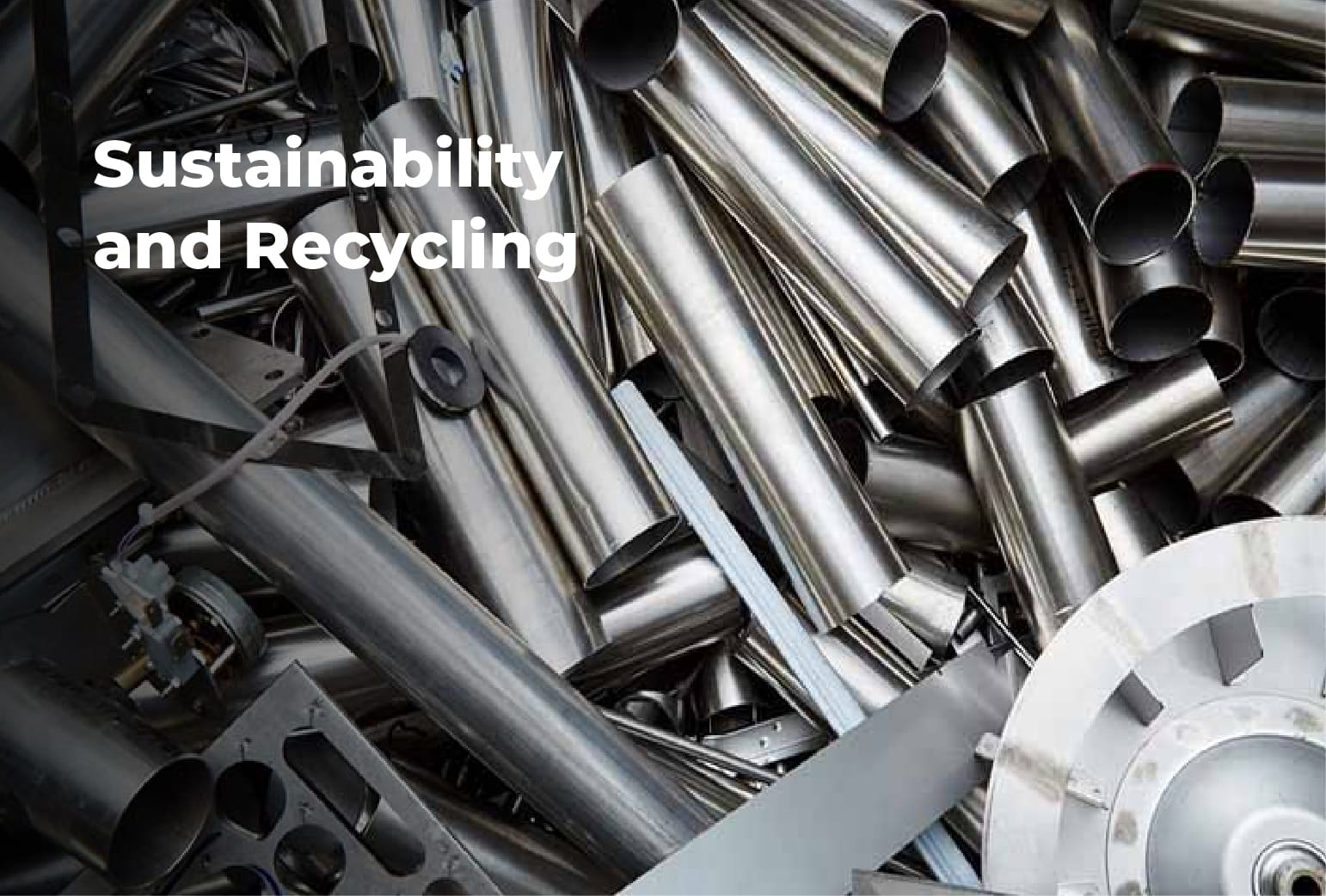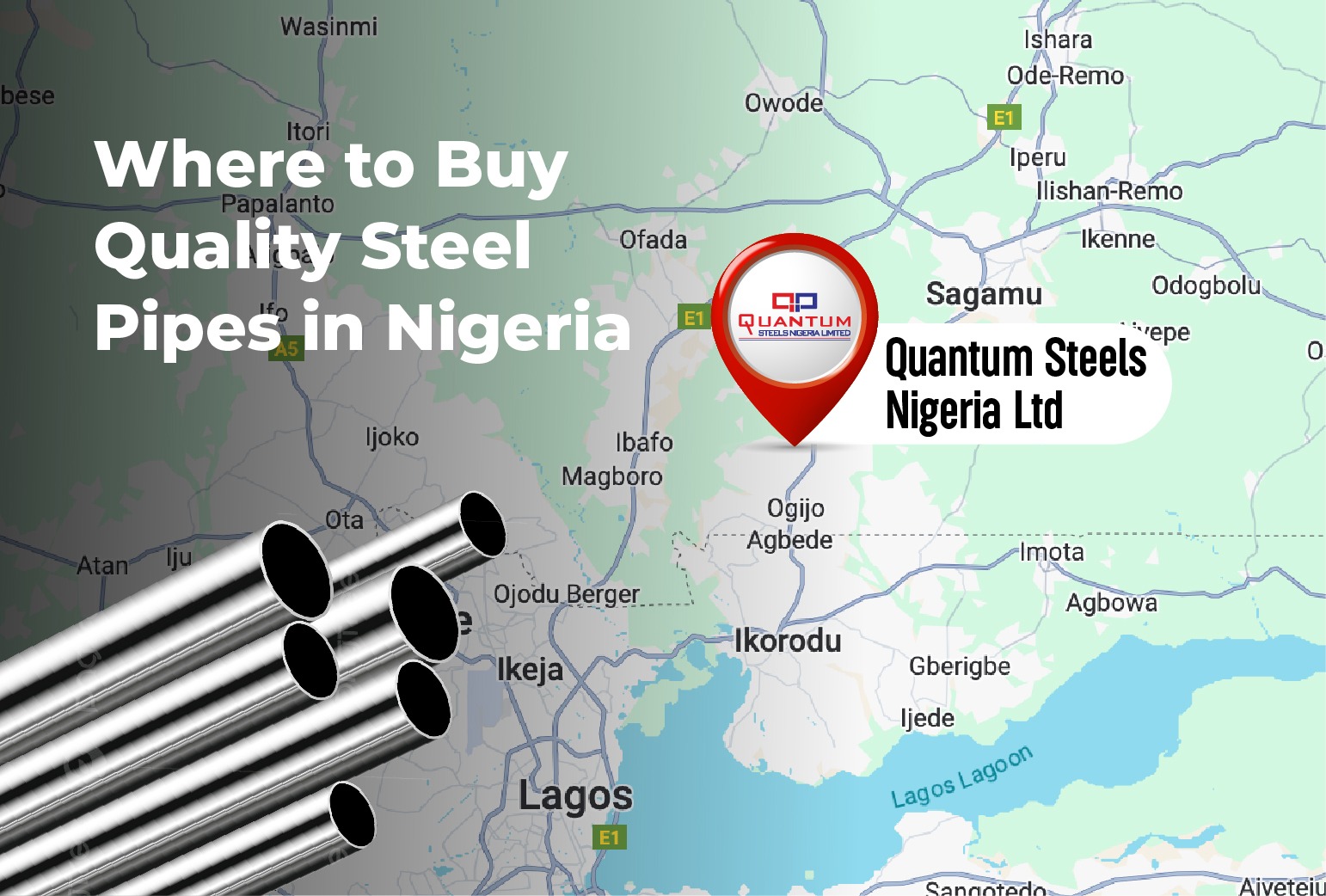Ultimate Guide to Steel Pipes
.jpg)
Steel pipes are the unsung heroes of modern infrastructure, forming the structural and operational foundation for cities, industries, and economies around the world. They can be used for transporting water through intricate urban plumbing systems to moving crude oil across long distances, steel pipes are essential to the everyday functionality and development of modern society. Their strength, durability, and adaptability make them a preferred choice in sectors such as construction, energy, manufacturing, and utilities.
In Nigeria, the demand for high-quality steel pipes continues to rise as infrastructure projects and industrial growth accelerate. This guide is designed to help you understand everything you need to know about steel pipes, ranging from the types available and their various uses to the manufacturing process, industry standards, and what makes steel superior to alternative materials.
What are Steel Pipes?
Steel pipes are long, hollow tubes primarily made from a mixture of iron and carbon, designed to handle a wide range of structural and fluid-transport applications. Commonly produced by a steel pipe manufacturer, these pipes are used in infrastructure, industrial systems, water management, energy, and mechanical installations due to their strength, durability, and resistance to high pressure and temperature.
Unlike pipes made from plastic or copper, steel pipes offer a unique blend of strength and flexibility, which makes them suitable for use in harsh environments and demanding operations. If embedded in the framework of buildings or buried underground for pipeline systems, their performance remains consistent over time, even under extreme conditions.
A typical steel pipe company may produce different types, including seamless, welded, galvanized, stainless, and carbon steel pipes, which are each tailored for specific industrial and commercial uses. As infrastructure development grows across the country, steel pipe manufacturers in Nigeria are playing an increasingly important role in supplying high-quality, locally produced steel pipes that meet both national and international standards. These manufacturers cater to the needs of industries and people looking for reliability, long service life, and technical efficiency in their materials.
Key Features
.jpg)
Steel pipes are highly valued for their exceptional physical and mechanical characteristics, which make them suitable for a wide range of industrial, structural, and utility applications. One of the key reasons steel pipe manufacturers in Nigeria and across the world continue to prioritize steel as a material of choice is its ability to withstand extreme pressure, temperature fluctuations, and mechanical stress without compromising structural integrity.
Known for their high tensile strength, steel pipes are a great choice for load-bearing construction and civil engineering projects. They have a natural resistance to rust, corrosion, and chemical reactions, which makes them well-suited for environments exposed to moisture, saltwater, industrial chemicals, or other harsh elements. These attributes allow steel pipe companies to offer products that are not only reliable but also capable of performing consistently in challenging operational settings.
Durability is another defining feature. Steel pipe manufacturers design pipes with longevity in mind, ensuring they can function effectively over long periods with minimal maintenance. This reduces downtime, repair costs, and the total cost of ownership, which are factors that are crucial in large-scale projects and long-term infrastructure planning.
Additionally, steel’s recyclability adds an environmental benefit to its functional strengths, reinforcing its position as a preferred material among engineers, developers, and governments. As a result, the widespread adoption of steel pipes in everything from water systems to energy facilities continues to grow, with top-performing steel pipe manufacturers leading the charge in innovation and quality assurance.
Types of Steel Pipes
.jpg)
Steel pipes are manufactured in various forms, each tailored for specific industrial, commercial, and structural applications. The differences in their production methods, coatings, and material compositions result in varying levels of strength, flexibility, corrosion resistance, and cost. Understanding these types is essential for selecting the most suitable pipe for your intended use. Across the country, steel pipe manufacturers in Nigeria offer a broad selection of steel pipes designed to meet industry-specific needs.
Seamless Steel Pipes
Seamless steel pipes are produced without any welded joints, which gives them a uniform structure and excellent strength under pressure. These pipes are made by piercing solid billets of steel and are ideal for high-pressure environments such as oil and gas pipelines, chemical processing, and power plants. Without welds, the risk of failure is significantly reduced, making them a top choice in applications that demand reliability and precision.
Welded Steel Pipes
Welded steel pipes are manufactured by bending steel sheets or coils into cylindrical shapes and welding the seam. Although they may not match the pressure tolerance of seamless pipes in some cases, modern welding techniques have significantly improved their strength and integrity. Welded pipes are more economical and are commonly used in construction, water supply, and industrial fabrication. They remain a popular product line among many steel pipe manufacturers due to their cost-effectiveness and versatility.
Galvanized Steel Pipes
Galvanized steel pipes are coated with a layer of zinc to protect them from rust and corrosion. This zinc coating enhances their durability, especially in outdoor or wet environments. These pipes are often used in plumbing, fencing, and structural applications where moisture exposure is frequent. Many steel pipe companies offer galvanized options for clients seeking long-lasting performance in corrosive environments.
Stainless Steel Pipes
Stainless steel pipes are composed primarily of iron, chromium, and other alloying elements that provide excellent corrosion resistance. These pipes are widely used in industries like food processing, pharmaceuticals, and chemical transport, where hygiene and resistance to oxidation are critical. Their ability to withstand extreme temperatures and aggressive cleaning agents makes them suitable for sterile and high-performance environments.
Carbon Steel Pipes
Carbon steel pipes are made primarily from iron and carbon, with minimal alloying elements. They have high strength and hardness, making them an excellent choice for transporting fluids such as oil, gas, and steam at high pressures and temperatures. Their affordability and durability make them a common feature in mechanical systems, industrial plants, and civil engineering projects. As one of the most in-demand products supplied by steel pipe manufacturers in Nigeria, carbon steel pipes are known for their versatility and strength.
Applications of Steel Pipes
.jpg)
Steel pipes are an essential component in numerous industries, due to a strength, durability, and adaptability that few other materials can match. Their ability to handle high pressure, extreme temperatures, and corrosive environments makes them a preferred choice across a wide range of uses. As demand grows, steel pipe manufacturers in Nigeria continue to produce specialized pipes to meet the specific requirements of different sectors.
Below are some of the key applications of steel pipes:
Industrial Uses
Steel pipes play a vital role in industrial operations. They are commonly used in boilers, refineries, power plants, and chemical processing facilities. Their ability to withstand high pressure and temperature conditions makes them suitable for transporting steam, chemicals, and other industrial fluids. Industries rely on steel pipe manufacturers to provide durable and corrosion-resistant pipes that meet stringent performance standards.
Construction Uses
In the construction sector, steel pipes are used for structural support, piling, scaffolding, and framework in buildings and bridges. Their strength and load-bearing capacity ensure stability and safety in large-scale infrastructure projects. Many steel pipe companies supply customized sizes for structural applications, making them a key component in modern architecture and civil engineering.
Automotive and Mechanical Uses
The automotive and mechanical sectors use steel pipes in vehicle exhaust systems, hydraulic lines, and machinery components. These pipes provide the strength and flexibility needed for heavy-duty operations while maintaining performance under constant stress and vibration. Precision-engineered pipes from steel pipe manufacturers help ensure durability and reliability in these critical applications.
Utility And Water Management
Steel pipes are a fundamental part of water distribution and wastewater management systems. They are used in pipelines that carry potable water, sewage, and drainage in residential, commercial, and industrial areas. Their corrosion resistance and durability make them suitable for long-term use in water infrastructure projects. Steel pipe companies often provide galvanized pipes for added protection in such applications.
Oil And Gas
The oil and gas industry is one of the largest consumers of steel pipes. These pipes are essential for drilling, transportation of crude oil and natural gas, and refinery operations. Seamless and welded steel pipes are widely used because they can handle the extreme conditions associated with this sector, including high pressure and corrosive substances. Top steel pipe manufacturers ensure compliance with international standards for safety and performance.
Manufacturing
In manufacturing, steel pipes serve as key components in machinery, conveyor systems, and product assembly lines. They are used for transporting raw materials, handling fluids, and fabricating machine parts. The versatility and strength of steel pipes make them indispensable in maintaining efficiency and productivity in industrial processes.
How Are Steel Pipes Made?
.jpg)
Steel pipes are produced using either the seamless or welded method. In the seamless process, steel billets are heated and extruded into hollow tubes without joints, ensuring uniform strength throughout. Welded pipes are created by bending steel strips or plates into a cylindrical shape and welding the seams. Both methods are followed by heat treatment, straightening, and surface finishing to achieve the desired mechanical properties and surface quality. Every stage of production is guided by precise engineering standards to ensure consistency and safety.
Steel Pipe Manufacturing Process
.jpg)
From raw material selection to final inspection, the manufacturing of steel pipes is a meticulous process. Steel is first melted and cast into billets or slabs, which are then heated and shaped into pipes. Depending on the type, the process may involve extrusion, rolling, or welding. After forming, the pipes are subjected to heat treatment and testing to check for defects or inconsistencies. As a reputable steel pipe manufacturer, Quantum Steels ensures each pipe meets both Nigerian and international standards for quality and performance.
Steel Pipe Sizes And Standards
.jpg)
Steel pipes are available in various diameters and wall thicknesses to suit different pressure ratings and structural requirements. Their dimensions follow global standards like ASTM, API, and ISO, which help ensure compatibility across industries and geographies. These standardized specifications also ensure that pipes can be safely used in systems that require precision and durability, from residential plumbing to industrial pipelines.
Advantages of Using Steel Pipes
.jpg)
Choosing steel pipes over other materials comes with significant benefits. They are durable, efficient, and capable of handling high pressure and temperature. Their resistance to corrosion and wear extends their service life, making them a smart investment for long-term projects. Steel pipes also perform consistently across a wide range of environmental and chemical conditions, reducing the risk of failure and minimizing downtime in operations.
Benefits of Using Steel Pipes
.jpg)
Steel pipes offer a unique blend of strength, efficiency, and longevity. Their ability to handle mechanical stress makes them suitable for both underground and above-ground installations. They provide safety, especially in systems that carry flammable or hazardous materials, and they’re adaptable to both high-speed manufacturing and demanding field conditions. Over time, these advantages translate to reduced maintenance costs, improved reliability, and enhanced operational efficiency.
Below are some of the key benefits that make steel pipes the preferred choice in numerous sectors:
- Exceptional Strength and Durability: Steel pipes can handle high pressure and heavy loads without bending or breaking, making them ideal for both industrial and structural applications.
- Corrosion Resistance: Special coatings and treatments allow steel pipes to withstand moisture, chemicals, and harsh environments, ensuring long-term reliability.
- Versatility: Steel pipes are available in various grades, sizes, and types (such as seamless, welded, galvanized, stainless, and carbon), making them suitable for diverse applications.
- Cost-Effectiveness Over Time: Although the initial investment may be higher, steel pipes require minimal maintenance, reducing long-term operational costs.
- High-Temperature and Pressure Resistance: Steel pipes can perform under extreme conditions, making them indispensable in sectors like oil and gas, power generation, and chemical processing.
- Consistent Quality and Standardization: Pipes supplied by certified steel pipe manufacturers meet international benchmarks for safety and performance, ensuring uniform quality across projects.
Steel Pipe vs Other Materials
.jpg)
When compared to materials like PVC, copper, or concrete, steel offers superior durability and performance. Unlike plastic, steel can endure extreme heat and pressure without deforming. Unlike copper, it offers greater strength at a larger scale and is often more affordable in heavy-duty applications. Concrete pipes, while strong, are far less flexible and significantly heavier, making steel the more practical option in most infrastructure projects. Steel also provides a more sustainable and recyclable solution.
Choosing the Right Steel Pipe for Your Project
.jpg)
Selecting the ideal steel pipe requires a clear understanding of your project's specifications and environmental conditions. It’s important to consider the fluid or material being transported, the pressure and temperature involved, and the potential for exposure to corrosive substances. Consulting with an experienced steel pipe company like Quantum Steels helps ensure that your project benefits from technical support, product quality, and timely delivery.
Sustainability and Recycling

Steel is one of the most recycled materials in the world. Its recyclability not only conserves raw resources but also reduces energy consumption during production. At the end of its lifecycle, steel pipe can be reused or repurposed without losing its core properties. This makes it an excellent choice for businesses and projects aiming to meet sustainability goals and reduce environmental impact.
Where to Buy Quality Steel Pipes in Nigeria

In today’s market, quality and reliability are non-negotiable. For durable, certified, and performance-tested steel pipes, Quantum Steels stands out as a trusted steel pipe manufacturer in Nigeria. Our products are engineered to support a wide range of industries, and our commitment to innovation, customer service, and quality assurance makes us the go-to partner for clients across the country.
Future Trends And Innovation in the Steel Pipe Industry

The steel pipe industry is evolving with technology, from automation in production lines to smart coatings that improve corrosion resistance. Innovations like modular pipe systems and precision-manufactured components are streamlining construction processes and reducing material waste. In Nigeria, demand for steel pipes continues to grow as infrastructure, energy, and housing sectors expand, opening up new possibilities for advanced applications and sustainable solutions.
Steel pipes continue to drive progress across industries, serving as the backbone of modern infrastructure and innovation. Their strength, durability, and adaptability make them indispensable for projects that shape our future in different sectors. For businesses and developers seeking reliable solutions, partnering with an experienced and trusted provider is essential.
As one of the leading steel pipe manufacturers in Nigeria, Quantum Steels combines advanced manufacturing processes with strict quality standards to deliver products you can depend on. Our wide range of steel pipes is engineered to meet diverse industrial requirements, ensuring performance, safety, and longevity for every project.
Are you ready to take your project to the next level? Contact Quantum Steels today to discuss your steel pipe needs and experience unmatched quality, expertise, and service. Let’s build stronger together with steel that stands the test of time. Reach out via our website www.quantumsteelsnigeria.com to get in touch with us.






